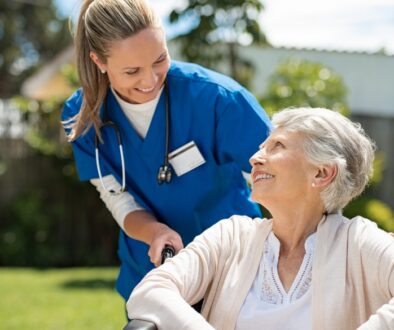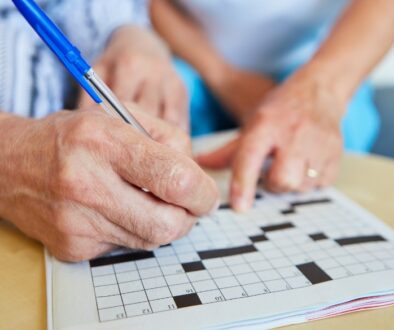Tips to for Helping Seniors Get Dressed
Getting dressed is a daily action that most of us take for granted.
We often don’t think twice about putting our arms up to dive into a sweater or reaching down to tie our shoes.
But in caregiving situations, a person may have lost the ability to dress themselves and may need help. Sometimes, this can cause challenging situations.
Many older adults prefer to be dressed in daytime clothes each day. Being dressed often helps them feel more confident and be more comfortable interacting with others.
But for many caregivers, helping someone dress and undress twice a day can be mentally and physically exhausting.
To help this process run more smoothly, here are 5 top tips for caregivers who are helping an older adult with dressing.
1. Allow extra time for dressing
Allowing plenty of time each day for dressing and undressing helps the process feel more relaxed, calm, and pleasant. That makes it more likely that your older adult will cooperate and help with the process.
Because of common health conditions, it usually takes a lot of extra time to help older adults get dressed.
For example, if your older adult has cognitive impairments like Alzheimer’s or dementia, they may not be able to sequence the steps of getting dressed or understand how a clothing item is worn.
Or if your older adult has lost flexibility, mobility, hand dexterity or is recovering from stroke or surgery, they may need to move slowly through the dressing steps to avoid pain.
2. Give simple choices
No matter a person’s age or cognitive ability, people like to have choice in what they wear.
Providing two or three appropriate, seasonal options help seniors maintain a sense of self and of control through the act of choosing what to wear.
3. Check for skin issues
While you help someone get dressed, it also gives you a chance to check for any skin issues so you can help them stay as healthy and comfortable as possible.
Redness, irritation, and pressure sores can quickly develop in people who have limited mobility or who usually don’t move around much during the day.
Pay particular attention to the buttocks, shoulder blades, elbows, and heels. It’s important to catch skin breakdown early to avoid open wounds and infections.
4. Reduce combative behaviors
When someone has Alzheimer’s or dementia, they may become combative when you try to help them dress or undress.
Sometimes, changing your approach can help. Each person is different, so it’s a good idea to try different approaches or timing to see what works best for them.
Some people may feel more comfortable if they see you approaching and helping with their clothes. If what you’re doing isn’t clearly visible to them, they might feel startled or scared.
But others might feel defensive and get combative if you stand in front of them while helping them with dressing.
If that’s the case, try approaching from the side (out of their direct line of sight) and gently putting your arm around them. This can help them feel less threatened by the dressing process — especially when a calm voice and gentle touch are used.
5. Search the Internet for specialized clothing and dressing tips
Many caregivers aren’t aware of how many resources there are that help with dressing.
Specialized clothing designed for seniors and caregivers is a growing part of the apparel industry — innovative new products are constantly being developed.
Try searching online for “adaptive clothing”, “clothing for dementia” (or another health condition), or “dressing aids” and you’ll likely find a wide variety of products that help with your older adult’s dressing challenges.
Source: DailyCaring.com




